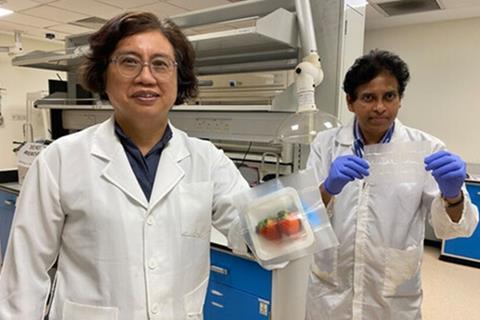
A team of scientists from Nanyang Technological University, Singapore and Harvard University claims to have developed a ‘smart’ food packaging material that is biodegradable and and kills microbes that are harmful to humans – all while extending the shelf-life of fresh fruit by two to three days.
The water-proof food packaging is made from a type of corn protein called zein, starch and other naturally derived biopolymers, infused with a cocktail of natural antimicrobial compounds. These include oil from thyme, a common herb used in cooking, and citric acid, which is commonly found in citrus fruits.
In lab experiments, when exposed to an increase in humidity or enzymes from harmful bacteria, the fibres in the packaging have reportedly been shown to release the natural antimicrobial compounds, killing common dangerous bacteria that contaminate food, such as E. Coli and Listeria, as well as fungi.
The packaging is designed to release the necessary miniscule amounts of antimicrobial compounds only in response to the presence of additional humidity or bacteria. This apparently ensures that the packaging can endure several exposures, and last for months.
As the compounds combat any bacteria that grow on the surface of the packaging as well as on the food product itself, the scientists say that the material has the potential to be used for a large variety of products, including ready-to-eat foods, raw meat, fruits, and vegetables.
In an experiment, strawberries that were wrapped in the packaging reportedly stayed fresh for seven days before developing mould, compared to counterparts that were kept in mainstream fruit plastic boxes, which only stayed fresh for four days.
“Food safety and waste have become a major societal challenge of our times with immense public health and economic impact, which compromises food security,” said Philip Demokritou, adjunct professor of environmental health at Harvard TH Chan School.
“We used nature-derived compounds to synthesise smart antimicrobial materials, which can be used not only to enhance food safety and quality, but also to eliminate the harm to the environment and health, reduce the use of non-biodegradable plastics at a global level, and promote sustainable agri-food systems.”














No comments yet